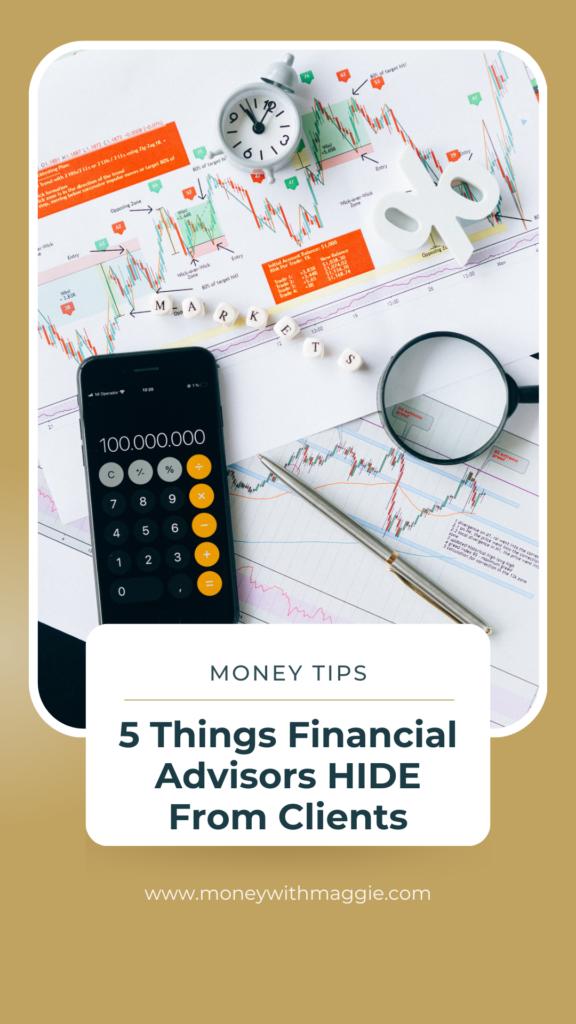5 Things Financial Advisors HIDE From Clients
In an ideal world, financial advisors would have your best interest in mind. But there are financial advisors that don’t and hide important details from their clients. Here are 5 important details about your investment portfolios that they are not telling you about.

I’ve had a boss tell me to explain things to clients in a way that’s so confusing, so that they would just ask me to manage their money for them. I know, that’s messed up on so many levels. And while I did that, I could’ve been empowering and equipping our clients with the knowledge to understand what’s going on inside their investment portfolio.
Experiences like that is why I’m here telling you exactly what your financial advisor could be hiding from you. You should never have to be taken advantage of or left in the dark with what’s happening with YOUR money.
So here are 5 things financial advisors could be hiding from you.
#1 The Total Cost of Your Portfolio
Financial advisors often leave out the details of your overall cost of your portfolio that you’ve invested with them. Usually there are two parts of the fee you pay to them: the management fee that they’ll usually tell you about and the fees of the fund that you’re invested in (which includes expense ratios & loads) that they probably are leaving out..
FYI, you’re probably paying around 1.4% of your portfolio to management fees and those fees can add up over time. To find out the fees you’re paying for your investments, just enter in the name(s) into Google and look for the front load fee, which is the fee you pay to get in, and then the expense ratio, which is how much you pay per year.
#2 Why They Chose Your Funds
The reason for choosing funds are kept hidden often because of the relationship with the fund managers. The fund managers hold meetings at investment firms, give a presentation to the financial advisors, and provide lunch and even a fancy dinner in exchange for using their funds for their clients’ portfolios.
#3 All That Your Fee Includes
You may not know everything that you’re entitled to for the fee that you’re paying to your financial advisor.
For example, financial advisors have plenty of investment tools they use and receive assessments that you should have access to, but if you don’t even know about it, they’re probably not going to show you them at all.
Not to mention they should be giving you quarterly updates on your portfolio. During those quarterly reviews, they should also be asking you how you’re feeling with everything that’s going on with their portfolio, with the market, and your money.
#4 If There Are Better Alternatives
There are often cheaper alternatives for you to be invested than how you currently are with your financial advisor. If they’re using mutual funds in your portfolio, there are probably better options with index funds. These index funds are more likely to give you better performance at a lower fee.
It’s up to you to challenge them and ask them why they aren’t using these index funds over these mutual funds. And honestly, they might twist the truth, so it’s best to see the numbers and look at the returns over time. You can compare investments by clicking the more about when you search the investment fund name on Google. Then just type in what investment funds you want to compare it to.
#5 You’re Being Charged For Cash
If you’re in a fee based portfolio, meaning you’re paying a certain percentage for the overall amount that you’ve invested with your advisor, you might be paying around 1% of those investments. If you have $100k invested, then you’re paying $1k in management fees at the least.
But what you don’t know is that you are paying a fee for the cash sitting in your portfolio. And this shouldn’t be happening. Make sure you’re only paying for the assets that are actually being managed for you.
There are lots of great financial advisors out there that are fully transparent and actually have your best interest in mind, but unfortunately, I’ve seen plenty of dishonest financial advisors that you should at least be aware of.
At the end of the day, you’re responsible for what happens to your money. So, be sure to do your research and don’t be afraid to ask the hard questions.

need help investing?
Let's Get Started Investing, Together.
Browse my best selling courses to get a solid foundation on how to start investing and preparing for your future!
PLEASE COMMENT BELOW